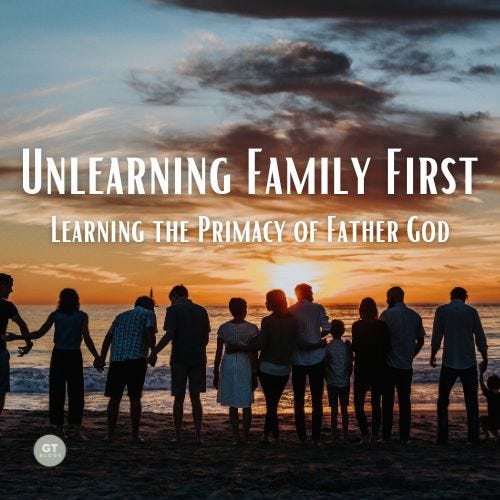I’m a bit nervous about this one. For months we've been going through my book in progress, tentatively titled "The Art of Unlearning." I've saved this one for last because it might sound most explosive, particularly coming from me. I've spent so much of my life trying to help families stay together and to find the purpose behind the challenges of family life, that it might seem odd I'm now talking about “unlearning” the tendency to put our families first or define ourselves by the “success” of our families. But I think this is a crucial lesson to learn to ultimately love our families well as we worship and serve God above all else. The reason I'm nervous is because with such a big topic, I'd like even more time to refine these thoughts before sharing them. But that's one of the purposes of this Substack column-to let you see my early thoughts and if you're so inclined, to help me refine, focus, and improve these words to take them to the next level. Thus, I'm asking you not to quote me from this one even while I'm encouraging you to share your thoughts in the comments section. This is an important topic, and I'm hoping that together we can create something that will serve God's church.
“I am a foreigner to my own family, a stranger to my own mother’s children; for zeal for your house consumes me, and the insults of those who insult you fall on me.”
Psalm 69:8-9
Nobody warned us what was coming. In fact, often we were promised the opposite. What we often heard was that being good pious Christians and hyper-involved parents would create a good pious family, all of whom would follow the Lord and raise grandchildren who would do the same. I can’t count the number of times in the 80s and 90s I heard or read someone mention Puritan preacher Jonathan Edwards, whose faith and life spawned many impressive descendants including fourteen college presidents, over a hundred ministers, another hundred college professors, and so on. I wasn’t told that Jonathan Edwards owned slaves. The implication was rather that if we were faithful in serving God, all our descendants would be as well. The slavery issue has seriously challenged that interpretation (blowing the “example” part to bits, and perhaps putting him in the category of a King David instead of a Samuel), and real life has seriously challenged the promise.
It wasn’t until I became an empty nester and friends with other empty nesters, that I began hearing other stories and perspectives. One earnest father with a broken heart told me, “Gary, I can’t think of hardly any Christian family with adult kids whose hearts haven’t been seared by their children’s lifestyle or rejection of faith.”
When a woman working for a major national ministry shared with me her grief over the pain of a recent son’s decision, I shared the quote above to encourage her. She paused and said, “Actually, none of my three boys are following the Lord.”
A counselor told me of “the godliest couple” he’s ever known, the kind of people who bring the presence of Jesus with them into every room. They were beloved at their church. God used them to heal many marriages and offer counsel to many young people who sought them out. “Their faith was so genuine and powerful and inviting,” the counselor told me. “It was amazing.” Yet when the mother died, an entire year went by before the estranged son even knew it. He was that estranged. An entire church mourned his mother’s passing. For him, his mother’s funeral was just like any other day ending with “y.” His absence in the church was stunning and painful and shocking.
Learning the primacy of “Father God”—our first, primary and most important “family” relationship—leads to a life that is stable and secure, in that our acceptance in Christ is certain and can’t be lost. Putting your sense of well-being and happiness in the hands of fallen people—even people who share your bloodline—is precarious, risky and hazardous to your peace. It’s like fool’s gold which sparkles from a distance, but up close its lack of eternal value will eventually become clear. We have to unlearn the desperation we feel for earthly families to fulfill us, and learn instead how to be fulfilled in the spiritual family to which God adopts us.
Keep reading with a 7-day free trial
Subscribe to Simply Sacred with Gary Thomas to keep reading this post and get 7 days of free access to the full post archives.


